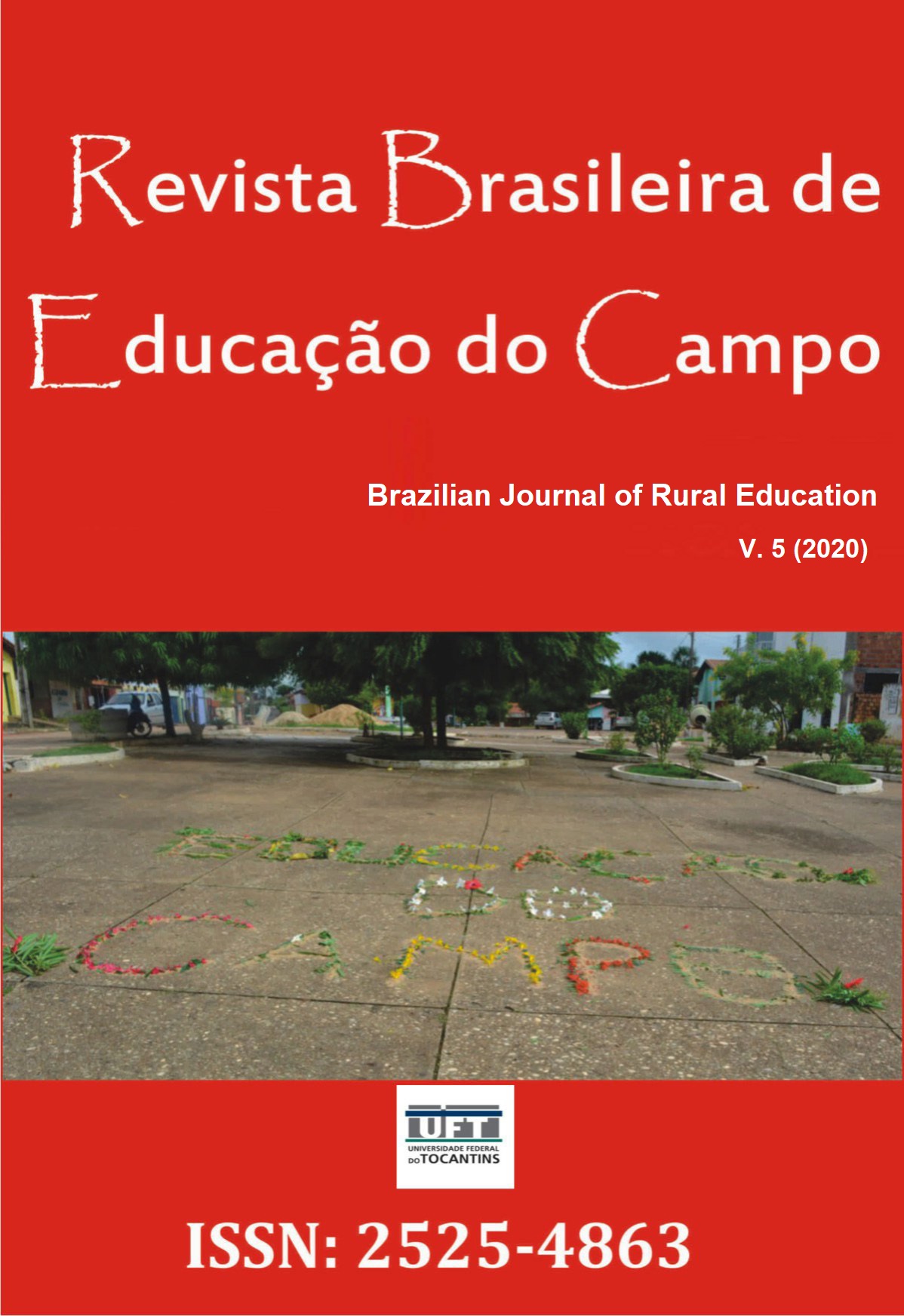The Águia Branca State Integrated Center for Rural Education: interfaces between Rural Education and Environmental Education
DOI:
https://doi.org/10.20873/uft.rbec.e7837Abstract
ABSTRACT. This article is an unfolding of a Master's research carried out at the Centro Estadual Integrado de Educação Rural de Águia Branca/ES (CEIER-AB). During our incubation at this school, we collected data for the development of our main objective: to identify the repercussions of environmental issues, to work on the school curriculum based on Generating Themes (TG), for graduating students, in 2018, third grade class of High School integrated to the Technical Course in Agriculture. We deal with the possibilities of contextualizing Environmental Education in its articulation with the education of the field developed at the Center, based on the pedagogical work with the TG, which considers the reality of the students' lives. In the methodology used, bibliographic and documentary research, questionnaires and observation. The results presented in the work developed by the school have their bases approved in Environmental Education, which work as an order of order and theoretical practices produced in the school, and this favored the creation of awareness regarding the preservation of the environment by the students.
Downloads
References
Altieri, M. A. (2006). Agroecologia: princípios e estratégias para a agricultura sustentável na América Latina do século XXI. In Moura, E. G., & Aguiar, A. C. F. (Orgs.). O desenvolvimento rural como forma de aplicação dos direitos no campo: princípios e tecnologias (pp. 83-99). São Luís, UEMA.
Azevedo, G. C. (2008). Uso de jornais e revistas na perspectiva da representação social de meio ambiente em sala de aula. In Reigota, M. (Org.). Verde Cotidiano: o meio ambiente em discussão (pp. 59-71). 3ª ed. Petrópolis: DP.
Bicalho, R. (2012). Educação do Campo e Movimentos Sociais. In Otranto, C. R., Fazolo, E., & Gouvêa, F. C. (Orgs.). Muito além do jardim: educação e formação nos mundos rurais (pp. 87-102). Rio de Janeiro: EDUR – Editora da Universidade Federal Rural do RJ.
Bicalho, R. (2016a). Interfaces entre escolas do campo e movimentos sociais no Brasil. Revista Brasileira de Educação do Campo, 1(1), 26-46. https://doi.org/10.20873/uft.2525-4863.2016v1n1p26
Bicalho, R. (2016b). Os movimentos sociais do campo e a formação do educador. Textura Canoas - ULBRA, 18(17), 5-26.
Bicalho, R. (2017). História da educação do campo no Brasil: o protagonismo dos movimentos sociais. Teias, 18(51), 210-224. https://doi.org/10.12957/teias.2017.24758
Bicalho, R. (2018). Interfaces da educação do campo e movimentos sociais: possibilidades de formação. Revista Pedagógica, 20, 81 - 100. https://doi.org/10.22196/rp.v20i43.3882
Caldart, R. S. (2008). Pedagogia do Movimento Sem Terra: escola é mais do que escola. Petrópolis, RJ: Vozes.
Caldart, R. S. (2012). Educação do Campo (pp. 259-267). In Caldart, R. S., Pereira, I. B., Alentejano, P., & Frigotto, G. (Orgs). (2012). Dicionário da Educação do Campo. SP. Expressão Popular.
Constituição da República Federativa do Brasil. (1988, 05 de outubro). Recuperado de: http://www.planalto.gov.br/ccivil_03/constituicao/constituicao.htm
Decreto nº 7.352. (2010, 4 de novembro). Dispõe sobre a política de educação do campo e o Programa Nacional de Educação na Reforma Agrária - PRONERA. Recuperado de: http://www.planalto.gov.br/ccivil_03/_ato2007-2010/2010/decreto/d7352.htm
Freire, P. (2014). Pedagogia do Oprimido. Rio de Janeiro, RJ: Paz e Terra.
Guimarães, M. (2007a). A formação de educadores ambientais. Campinas, São Paulo: Papirus.
Guimarães, M. (2007b). Educação ambiental: no consenso um embate? Campinas, São Paulo: Papirus.
Lei nº 9.795. (1999, 27 de abril). Dispõe sobre a educação ambiental, institui a Política Nacional de Educação Ambiental e dá outras providências. Recuperado de: http://www.planalto.gov.br/ccivil_03/leis/L9795.htm
Loureiro, C. F. B. (2003). Premissas teóricas para uma educação ambiental transformadora. Ambiente e Educação, 8(1), 37-54.
Portaria nº 236-R. (30, dezembro, 2014). Formaliza e organiza o funcionamento das escolas e turmas em tempo integral de Ensino Fundamental e de Ensino Médio da rede pública estadual. Diário Oficial do Espírito Santo, 02 de jan. pp. 38-39, 2015.
Santos, B. S. (2007). Renovar a teoria crítica e reinventar a emancipação social. São Paulo: Boitempo.
Triviños, A. N. S. (1987). Introdução à pesquisa em ciências sociais: a pesquisa qualitativa em educação. São Paulo: Atlas.
Veloso, N. (2007). Entre camelos e galinhas, uma discussão acerca da vida na escola. In Vamos cuidar do Brasil: conceitos e práticas em educação ambiental na escola (pp. 74-83). Ministério da Educação, Coordenação Geral de Educação Ambiental: Ministério do Meio Ambiente, Departamento de Educação Ambiental: UNESCO.
Published
How to Cite
Issue
Section
License
Proposal for Copyright Notice Creative Commons
1. Policy Proposal to Open Access Journals
Authors who publish with this journal agree to the following terms:
A. Authors retain copyright and grant the journal right of first publication with the work simultaneously licensed under the Creative Commons Attribution License that allows sharing the work with recognition of its initial publication in this journal.
B. Authors are able to take on additional contracts separately, non-exclusive distribution of the version of the paper published in this journal (ex .: publish in institutional repository or as a book), with an acknowledgment of its initial publication in this journal.
C. Authors are permitted and encouraged to post their work online (eg .: in institutional repositories or on their website) at any point before or during the editorial process, as it can lead to productive exchanges, as well as increase the impact and the citation of published work (See the Effect of Open Access).















